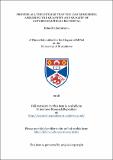Provide all the details that you can remember : assessing the quantity and quality of autobiographical retrieval
Date
06/12/2018Author
Supervisor
Funder
Keywords
Metadata
Show full item recordAltmetrics Handle Statistics
Abstract
People asked to recall the memory of an event during testimony are encouraged to prioritize both quantity and quality – "the whole truth and nothing but the truth". Extensive research has shown that people can provide detailed, confident accounts that nevertheless prove to be inaccurate (Loftus, 1996). However, the question remains of how pressuring people to give confident and elaborate accounts of their memories subsequently changes these accounts. We conducted an experiment in which 51 participants provided accounts of autobiographical events and film plots (control condition), and later re-told these accounts under the instruction to retrieve more information. We measured the effects of task demands on the quantity (number of words and number of facts) and quality (confidence ratings) of information retrieved, as well as on the affective and cognitive language used during each account. Task demands at re-telling led to participants providing a greater amount of information, with their likelihood of doing so and their confidence in these newly communicated memory details linked to rumination tendencies and mood. These findings give insights into the cognitive processing of autobiographical memories, and provide a better understanding of the factors affecting eyewitness testimony.
Type
Thesis, MPhil Master of Philosophy
Collections
Items in the St Andrews Research Repository are protected by copyright, with all rights reserved, unless otherwise indicated.

